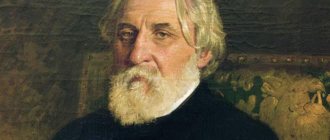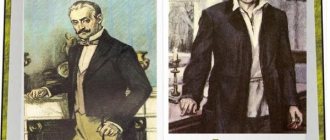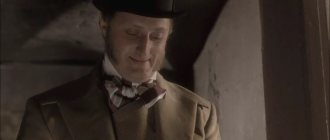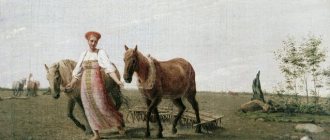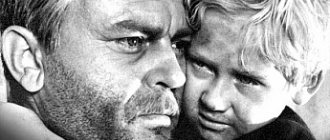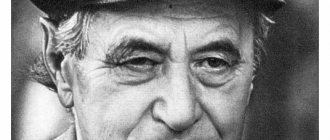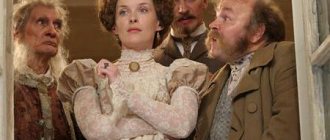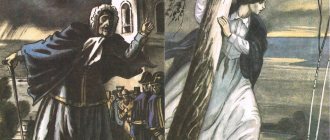The story of a serf boy (collection) - Alekseev Sergey Petrovich
Sergey Alekseev
The story of a serf boy
From the author
I am often asked the question: how did I become a writer?
As a child, I dreamed of many professions. I wanted to be a rural cab driver, a fireman, a geologist, an engine builder, and a diplomat. But I never thought that I would start writing books for children. Much in life happens by chance...
I was born in 1922, in Ukraine, in the family of a rural doctor. My homeland is that part of Ukraine called Podolia. This is an amazing land, inhabited by wonderful people, a land full of terrible historical events, remarkable legends and traditions. The liberation wars of Bohdan Khmelnytsky raged here. The nobility and fighting prowess of the Ukrainian Cossacks, so wonderfully sung by Gogol in Taras Bulba, competed. Here the Southern Society of Decembrists was born and the legendary Chernigov regiment made its heroic campaign in search of “miracle freedom”. The red horsemen of Semyon Budyonny rushed through my native village with their sabers drawn, breaking through the enemy front, and then went through the harsh battles of the Great Patriotic War. In the neighboring village of Borshchagovka, Kochubey, an enemy of Mazepa and a supporter of Peter and the alliance with Russia, was executed. In another village - Verkhovna, on the estate of the Polish magnates Gansky, the great French writer Honore de Balzac spent the happiest years of his life.
Story. Story. Story. She breathed from the neighboring fields and became my first love.
Second love is aviation. My youth coincided with that heroic time when, through the efforts of our pilots, our country broke through into the sky. Here are just some of the brave names: Valery Chkalov, Mikhail Gromov, who flew over the North Pole to the United States of America; our heroine pilots Valentina Grizodubova and her friends, who quickly flew across the entire country without landing from Moscow to the eastern shores of our state. Polar pilots who became the first Heroes of the Soviet Union, saving the famous Chelyuskinites from the ice captivity of the frozen Northern Ocean.
Thousands of my peers wanted to become pilots. I dreamed too. While still a schoolboy, I learned to fly, albeit on a small, albeit slow-moving in modern times, but a real airplane. Then he became a cadet at the military aviation pilot school. Soon the Great Patriotic War began. Our school was located near the German border. On the very first day of the war, we entered into an unequal battle with the Nazis. Almost all of our planes and many of my comrades were killed. The difficult days of retreat began. I survived both death and captivity. He was sent to a new flight school. He graduated from it and became a pilot instructor, that is, he began teaching others how to fly.
I thought that my entire future life would be connected with aviation. But... Flying work is not a safe business. The trouble did not escape me either. After a serious accident, the doctors’ merciless verdict followed: “Not fit to fly.” Many years have passed since then. But to this day, when I hear the rumble of an airplane, I always raise my head up. A second - and I’m already there: soaring in the heights. There is sky and space all around. And the earth runs, runs, runs below...
I entered civilian life with a diploma in history. As a pilot, he graduated in absentia from the history department of the Pedagogical Institute. In those years, a competition was held in the country to create a new school textbook on the history of the USSR for primary schools. I took part in this competition and, together with Professor V.G. Kartsev, emerged as the winner. By chance, the textbook fell into the hands of the wonderful children's writer Sergei Mikhalkov, and he advised me to write a book of historical stories for children. I tried. The book turned out great. She was published from afar. It was a book about Tsar Peter I, “The Unprecedented Happens.” I immediately wrote a second book - “The History of a Serf Boy.” It was also published, and in the same year I was accepted as a member of the Writers' Union. So, without thinking, without guessing, I began to write historical books for children. I've been writing for many years. The books were published and reprinted. Translated into many foreign languages.
You have one of these books in your hands. It's called "One Hundred Stories from Russian History." The book begins with stories about Tsar Ivan IV the Terrible. This was one of the outstanding sovereigns. Under him, our country grew stronger and expanded. New cities began to be built. Arkhangelsk, Samara, Kursk, Voronezh, Saratov, Tsaritsyn (modern Volgograd) and many others were founded precisely under Tsar Ivan IV. It was under him that the first printed book appeared in Rus'. The first geographical map of Russia was drawn up, and Siberia joined Russia. A lot of other things happened in our country during the reign of Ivan IV. He was a stern, demanding man. It was not for nothing that they called him the Terrible. And one more thing: before the Tsar, Ivan IV, the rulers of Russia bore the title of Grand Dukes. Having ascended the throne, Grand Duke Ivan IV was the first to call himself Tsar. It was from him that the tsars came to Russia.
In the 17th century, a wave of popular uprisings swept through Russia. Unrest swept across the Don and almost the entire Volga. The rebels went to war against the then existing order. At the head of the dissatisfied was the decisive Don Cossack Stepan Timofeevich Razin. With great difficulty, the royal troops managed to cope with the rebellious ones. “Stories about Stepan Razin, the Cossacks and the Rebellious People,” which made up the second chapter of this book, will introduce you to those turbulent years.
The activities of the Russian Tsar Peter the Great, called the Great, played a huge role in the history of our country. About the first years of his reign, about the fight against enemies for access to the shores of the Baltic Sea, about the founding of the city of St. Petersburg, about the construction of new plants and factories, about the publication of the first Russian newspaper, about how they studied in Rus' during the reign of Peter the Great, and you will read about much more in the third section of the book, which is called “Stories about Tsar Peter and his time.”
One of the most beloved heroes of Russian history was and remains our great commander Alexander Vasilyevich Suvorov. It was he who taught Russian soldiers to win “not by numbers, but by skill.” He said: “The brave are always in front, the coward is always killed behind”, “Die yourself, but save your comrade”, “The fewer the troops, the more brave.” You will learn from the fourth chapter how Suvorov knew how to defeat enemies, how he stormed the Turkish fortress of Ishmael, how at the age of seventy he made a heroic transition with his soldiers through the high Alpine mountains, as well as why the soldiers loved Suvorov so much and the enemies were so afraid of him. "Stories about Suvorov and Russian soldiers."
A difficult test befell our homeland in 1812. The troops of the French Emperor Napoleon I attacked Russia. The enemies were going to conquer Moscow. The Patriotic War of 1812 began. Field Marshal Mikhail Illarionovich Kutuzov was placed at the head of the Russian army. “Kutuzov came to beat the French,” said the Russian soldiers. The Russians defeated Napoleon, drove the enemies across Europe to the very French border and entered the capital of France, the city of Paris, as victors (“Stories about the Patriotic War of 1812”).
The last section of the book is called “Stories about the Decembrists.” For a long time, serfdom existed in Russia. Many millions of inhabitants of our country - peasants - belonged to landowners. Serfs could be bought, sold, exchanged, flogged to death. In Russia there were people who opposed such orders. They wanted to destroy the tsarist power in Russia and give freedom to the peasants. The uprising against the Tsar took place in December 1825. Therefore, its participants began to be called Decembrists. However, the forces were unequal. The king defeated the rebels. Five of them were executed. Many were sent to distant Siberia for hard labor. Thirty-six years after the Decembrist uprising, serfdom in Russia was abolished.
Dear Guys! Here is a book for those who love their native history, who are proud of our great past, who, having become adults, will not spare their efforts to create a rich and fair state on our ancient land.
Good luck and good health to you.
Sergey Alekseev
Interesting topics
- Sladkov - Forest hiding places
The narrative begins with the narrator visiting the forest in order to discover a small owl, which is called the funny and fabulous name Scops Owl, due to the fact that it makes a screaming sound - Geraskina - In the land of unlearned lessons
In his work, the author presented a story that is full of humor and original moments. This story by a wonderful talented woman L. Geraskina captivates the young reader. - Chekhov - Steppe
The main character - Yegorushka Knyazev - together with his uncle Ivan and his father, whose name is Christopher, are heading on a long journey. The final destination of this journey is the gymnasium - Nekrasov - Who Lives Well in Russia
One day, seven men meet on a highway. They are former serfs originally from the villages of Zaplatova, Dyryavina, Razutov, Znobishina, Gorelova, Neelova, Neurozhaika.
Summary of the story “The Story of a Serf Boy”: chapter two (“Dasha”)
Next to the modest possessions of Mitya’s lady was the luxurious Novgorod estate of Count Alexei Gushchin (Barabikha). This nobleman rarely appeared there, so the German manager Franz Neumann was in charge of the estate almost all the time.
One day the count demanded that the manager prepare the serf orchestra and theater for the New Year. Neumann began to gather peasants inclined to play music throughout the area. One day he happened to hear Mitya (who by that time had been assigned to herd geese) play the pipe. Assessing the guy’s talent, Franz bought him from Mavra Ermolaevna for 2 bags of oats and an old feather bed.
The estate in Barabikha was large. Many serfs lived there, and the attitude towards them was several times better than that of the previous owner. Gradually the boy got used to it and became friends with a young artist named Dasha.
Despite all the good things, Mitya went on the run. He was overtaken by the terrible mute huntsman Fyodor, who was sent in pursuit. However, he did not give the fugitive to the Germans, but hid him in his kennel for a long time. Soon the boy became friends with the man and learned that his tongue had been torn out because of his participation in the Pugachev crime.
When Myshkin was discovered by Franz, the guy got a lot of trouble. But Dasha and Fedor came out.
The New Year was approaching, and a dress rehearsal was underway at the theater. Dasha played one of the main roles and accidentally fell. The manager wanted to beat her, but Mitya interceded. Fleeing from the German's wrath, the children ran out into the cold. The girl, dressed in light theatrical clothes, caught a cold and died of the disease a few days later.
In an effort to avenge her, Mitya set fire to the house in which the German lived. The servants did not particularly try to save the manager, and those who tried were stopped by the mute Fyodor, who, through a misunderstanding, was considered the culprit of the fire.
Myshkin, taking advantage of the situation, escaped.
Popular retellings today
- The day before - a summary of Turgenev's story
On a hot summer day on the banks of the Moscow River, young men lay under a spreading linden tree. Just graduated from university - Andrei Bersenev and a young sculptor, Pavel Shubin. The young men lay in the shade of a linden tree and talked about the meaning of life and love. - Gorky
Every person who has visited Nizhny Novgorod learns from the lips of a guide that one of the great writers, Maxim Gorky, was born in this city. - Portrait - a summary of Gogol's story
The sad story of the young artist Chartkov began at the Shchukinsky yard, where he bought a painting with his last money. The painting showed an old man in Asian attire, and his eyes were so piercing - The azure steppe - a summary of Sholokhov's story
The main character of the work is grandfather Zakhar, a serf coachman. The action takes place during the Civil War. The grandfather had two grandchildren - Semyon and Anikey. Semyon had a wife Anisya and a small son
Chapter three. Guards Lieutenant
Mitka got out onto a large highway, where he, half-frozen, was picked up by a young guards officer heading to St. Petersburg. The officer took Myshkin to the station and wanted to turn him in as a fugitive, but the boy slipped away and slipped back into the sleigh. At the next station, an officer found Mitka, laughed and took it for himself. Mitka became an orderly for the lieutenant of the Imperial Life Guards regiment, Alexander Vasilyevich Vyazemsky. The new owner turned out to be kind, cheerful, told interesting stories about the war with the Turks, and the boy served him not out of fear, but out of conscience.
Soon Vyazemsky argued with one dragoon major. A duel took place, after which the Life Guards officer turned into an army lieutenant and went into the active army. He wanted to send Mitka to his estate, but the boy persuaded the master to take him with him to the war to “beat the Turk.”
This is how Mitka ended up at the Turkish fortress of Izmail. Suvorov himself came to take the impregnable fortress. One day, the great commander noticed Mitka and ordered Vyazemsky to send the child away from the war. The lieutenant delayed leaving, and the boy had to sit in his tent all the time.
The assault on Izmail began on the night of December 11, 1790. Watching the battle from afar, Mitka noticed the lieutenant - he was the first to climb the wall of the fortress, and then fell, wounded in the side. Mitka rushed to save the master, made his way into the captured Ishmael and pulled the lieutenant out of the battle. At the gate, Mitka collided with Suvorov. He tore the boy by the ear and then awarded him a medal for bravery and devotion.
A few days later, Vyazemsky was forgiven for the duel, and the lieutenant went back to St. Petersburg. The officer was proud of Mitka and swore not to give him to anyone. In St. Petersburg, Vyazemsky made a new friend - Captain Pikin. He called Suvorov an upstart and believed that slaves should be kept in strictness. Vyazemsky tolerated Pikin only because he did not know his limits in a card game. One day they started playing, and Vyazemsky lost to his faithful Mitka. Myshkin did not wait until they handed him over to the captain and left.

